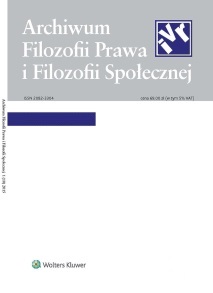Czy grozi nam kryzys prawa? Rozważania na tle problemu tzw. roszczenia do słuszności
Are we facing a crisis of law? Reflections in reference to the so-called claim to correctness problem
Author(s): Paweł SkuczyńskiSubject(s): Law, Constitution, Jurisprudence, Philosophy of Law, Philosophy of Law
Published by: Stowarzyszenie Filozofii Prawa i Filozofii Społecznej – Sekcja Polska IVR
Keywords: Gustav Radbruch; Radbruch’s formula; nonpositivist concept of law; claim to correctness; abominable law; statutory lawlessness; legal ethics
Summary/Abstract: What is usually acknowledged as a topicality indication of Gustav Radbruch’s legal philosophy is the theoretical interest in and practical application of his ideas – known as the Radbruch’s formula – on abominable law, statutory non-law and the refusal to apply it by public authorities, the judiciary in particular. The article main argument is that we can point to other than Radbruch’s formula elements in his philosophy of law which are still applicable and present in the recent discussion on the concept of law itself, its validity and application. What this means is basic to Radbruch’s thought the distinction between the concept of law (Rechtsbegriff), the idea of law (Rechtsidee) and the relationship between the two. The solution accepted by Radbruch in this matter is very broadly applied by the representatives of the nonpositivist concept of law. However, the solution may be ascribed a more general meaning, which manifests itself in the ‘claim to correctness problem’ (Anspruch auf Richtigkeit). Such a claim has to be an element not only of law itself but also of all legal statements including acts of applying the law. The point I endeavour to defend is that out of the three interpretations of the claim to correctness problem, the one which refers not only to the correctness of legal order and law application acts, but also to lawyers’ professional obligations and responsibility is the best justified. This is because such a view most fully addresses the challenges of modern law, which has become increasingly professional in character, but on the other hand more prone to factors typical to fully professionalised walks of life – to critical factors especially. The question of how much the interpretation is compatible with Radbruch’s perspective, is beyond the scope of this analysis. However, some arguments suggesting higher degree of concordance will be presented.
Journal: Archiwum Filozofii Prawa i Filozofii Społecznej
- Issue Year: 3/2011
- Issue No: 2
- Page Range: 61-75
- Page Count: 15
- Language: Polish

